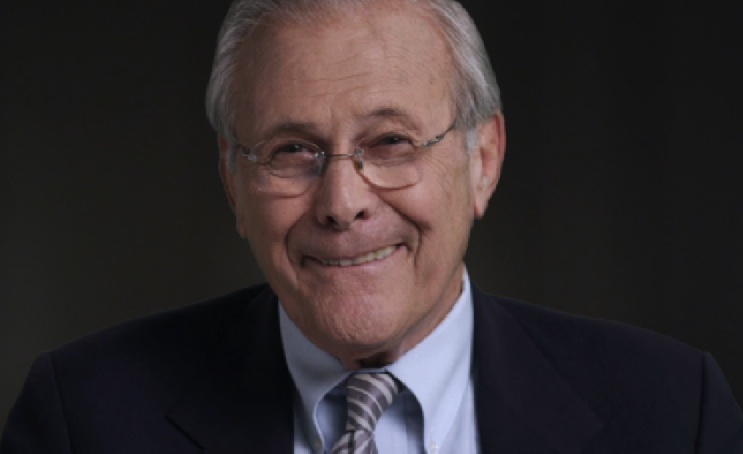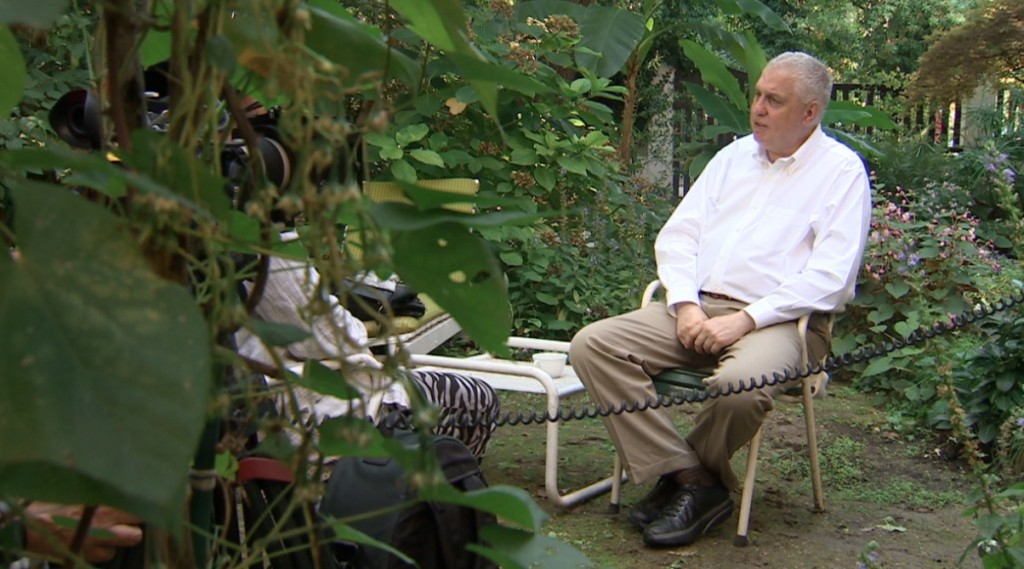
Dear Blog Readers — Yesterday I covered my favorite film so far in the festival, it is a documentary called “The Unknown Known” about former US Secretary of Defense Donald Rumsfeld. Given where the US stands now — poised to attack Syria — the documentary is chilling. Today I was lucky enough to have a sitdown interview with the director Errol Morris, who just happens to be from Cambridge, Massachusetts — where I was born and have spent considerable time.
Morris’ film provides an unflinching look at the career of Rumsfeld through Rumsfeld’s own words, and with the help of some of the tens of thousands of memos, which Rumsfeld calls “Snowflakes”, which he wrote over the course of several decades while holding some of the most powerful positions in the US government. According to Morris, Rumsfeld himself is the greatest mystery of the film.
Speaking to reporters at a press conference yesterday in Venice, Morris said, “The mystery deepens because in the last couple of days he has come out against intervention in Syria saying that it would be a mistake. I suppose my question is, and it may be your question as well, “why now and not ten years ago?”
The film analyzes, with Rumsfeld’s narration, the US decision to go to war in Afghanistan and Iraq after the September 11, 2001 attacks on the US. It goes over details of policies of President George W. Bush’s administration where Rumsfeld served as Secretary of Defense, including the decision to open the Guantanamo Bay prison, the expansion of torture techniques and the choice not to recognize the Geneva Conventions for prisoners taken in Afghanistan. It also takes glimpses back into history getting Rumsfeld’s comments on the attack on Pearl Harbor and the Fall of Saigon.
Rumsfeld’s comments, edited together with news clips of press conferences at the Pentagon reveal errors, inconsistencies and contradictions in Rumsfeld’s assertions. He bends the truth on many issues such as the presence of nuclear weapons in Iraq and the role of Saddam Hussein in the September 11, 2001 terrorist attacks. At the same time, Rumsfeld reveals a widespread knowledge of complicated foreign policy issues and shows a great command of language manifested in an obsession with words. Many of his memos are about definitions of terminology to be used by the Pentagon such as “unconventional warfare” and “guerilla warfare.”

Morris told me today, “he has an extraordinary gift for words. It is an odd gift because words often for him aren’t used to elucidate or clarify, they are used as a smokescreen, they are used to obfuscate, to confuse, but he does it more effectively than anyone I have ever met before.”
Morris also revels in the debate over words and enjoys their own verbal and intellectual sparring over Rumsfeld’s famous statement,
“There are known knowns; there are things we know that we know. There are known unknowns; that is to say, there are things that we now know we don’t know. But there are also unknown unknowns – there are things we do not know we don’t know.”
The two apparently also sparred over another quote from Rumsfeld, used in a memo about weapons of mass destruction in Iraq sent to President George W. Bush, “The absence of evidence is not evidence of absence.”
Morris said he now has his own exchange of memos with Rumsfeld over this “absence of evidence” exchange in the film. As Morris said to me, “Well if absence of evidence for weapons of mass destruction isn’t evidence of their absence you can use that kind of principle to justify just about anything.
But Morris said he preferred to stand back and let Rumsfeld do the talking. “If I am going to be an executioner,” Morris said with a twinkle, “I am going to have them hung with their own words. ”
The biggest “unknown known” in the film is Rumsfeld who reveals himself to be in director Errol’s words a “mystery” and a kind of “Cheshire Cat” from “Alice in Wonderland” who disappears leaving just a devious smile behind.
According to Morris, “His smile tells me he is immensely pleased with himself, he doesn’t have any guilt about anything he does. There is a hint of sadism in that smile.”
Errol said he did a total of 33 hours of interviews with Rumsfeld who made a total of four trips to Boston to be interviewed in a studio near Errol’s home.
Errol’s documentary “The Fog of War”, looking at former US Secretary of Defense Robert McNamara, won the Academy Award and the Grand Jury Prize at the Sundance Film Festival.

Curious that Rumsfeld would allow him such insight. Sounds fascinating and also confirming our feelings on Rumsfeld. Hang him by his own words sounds like a good strategy!
A lot of people were asking Morris at the press conference why Rumsfeld would agree to such an interview. I think his answer was something along the lines of “narcissism, arrogance and hubris”. Morris said he sent Rumsfeld a copy of his film on McNamara “Fog of War” and after that Rumsfeld agreed, but he wasn’t sure Rumsfeld even watched the “Fog of War” .
I can not wait to see this. Secretary Rumsfeld has been all over the news here discussing possible U.S. intervention in Syria. I remember how at first he amused us all with his Rumsfeldspeak. However, for many of us the initial amusement turned to horror and disgust as the war in Iraq progressed. Thanks for featuring this one.
Thank you Adri. It is true, a lot of people were impressed with his Rumsfeldspeak….I think journalists loved covering him just for that, and yes “amusement to horror and disgust” is an accurate summary.
Brilliant interview. Such a courageous fellow, to make this film. I wouldn’t want to be in the same room with Rumsfeld. I will look for it, whereas, without your post, I would likely have passed it by. Thanks! And keep on sending the news from Venice –
Thank you Nancy — Errol Morris is a brilliant man. I think he loved being in the same room for hours interviewing Rumsfeld– he loved the verbal sparring and the challenge of trying to get Rumsfeld to explain all his actions over so many years in positions of power.
Great preview of what sounds like a must-see documentary. I think the Cheshire Cat linkage is brilliant.
Hi Els — It is definitely a must-see documentary, especially with what is going on now over Syria. It just seems like sometimes US policy gets into strange patterns — find a bad guy in the Middle East (Saddam, Assad) that we have already put up with for a long time, find an excuse to attack (Weapons of Mass Destruction, Chemical weapons) and then unleash US military power. Bad idea. It is not that I approve of the use of chemical weapons in Syria (obviously I do not), but I don’t think a US attack could help Syrian civilians – caught in the middle of a brutal civil war– in any way. In my opinion it will only make things worse. Morris’ film helped me see how that happened in other places in the past.
If only someone would probe into Barack Obama to such a degree of depth, trying to interpret his every word. HE is the biggest unknown and THAT is well-KNOWN.
Morris would be just as critical of Rumsfeld if he were in favor of a war with Syria too.
Errol Morris is such a good interviewer, I would love to see him interview any number of important people, including Barack Obama. I told him I would love for him to do a documentary on Hillary Clinton. He said he will probably have to wait 10 years or so on that.